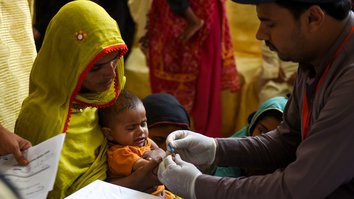PESHAWAR -- The Khyber Pakhtunkhwa (KP) government's decision to offer free treatment to HIV-infected patients from Afghanistan has given a new lease on life to people who had lacked treatment options back home.
"It is a big help and improvement to our lives, and we should be thankful to the Pakistan government for giving us free testing and treatment in Peshawar," said Janbaz Noorzai, a 35-year-old native of Kabul.
Janbaz, who had been working in the United Arab Emirates as a bus driver, said he was deported in June 2016 after he tested positive for HIV.
Since then, he had been living in Kabul without opportunities for treatment.
"I have been sick more often than not," he told Pakistan Forward. "Because of HIV, I am vulnerable to other illness due to low immunity."
Janbaz was admitted February 3 to the Antiretroviral Therapy (ART) Centre in Hayatabad Medical Complex (HMC), Peshawar.
He said treatment has brought about a complete change in his health, as he is no longer vulnerable to opportunistic ailments.
A blessing for HIV patients
The KP government's decision to provide free services to Afghan patients with HIV on humanitarian grounds has been well received from local residents, said Dr. Tohid Shah, a physician at the ART Centre in Peshawar.
"Previously we refused Afghan patients, but three months ago, the government allowed free treatment of patients from Afghanistan and the Federally Administered Tribal Areas," he told Pakistan Forward.
Currently 26 patients from Afghanistan, including three women and one child, are under treatment, he said.
The ART Centre in Peshawar is one of 16 such centres in Pakistan, established in 2008 to provide symptomatic treatment to people with HIV.
Antiretroviral therapy includes a combination of medications aimed at suppressing the HIV virus, stopping the progression of HIV disease and preventing onward transmission of HIV.
"On an average, we spend about $5,000 on management of one patient," Tohid said.
Masooma Bibi, 42, from Khost Province, said her husband died of HIV/AIDS in January 2016.
"He was deported from UAE on account of being positive but he didn't tell us about his illness and we came to know in the terminal stage of the disease," she told Pakistan Forward.
"After his death, I came to Peshawar for pain in my abdomen and my test also revealed I am HIV positive," she said.
"For the past three months, I have been receiving free treatment in the HMC," she said. "Prior to treatment, I was attacked by a host of ailments. Now, I don't feel weakness anymore."
Co-operation in HIV treatment, education
Afghan Minister of Public Health Ferozuddin Feroz said he appreciates Pakistan's "humanitarian step" to take patients from his country.
"Afghanistan is severely short of health facilities," he told Pakistan Forward in a phone interview. "The Taliban have damaged hospitals only to harm the people and prevent healthcare services."
Experts from the HMC will visit Afghanistan in the near future to train doctors and other medical staff on HIV awareness and treatment, Feroz said.
"The establishment of an ART centre in Kabul is also part of the co-operation," he said. The centre will "provide testing, treatment and counseling services to infected people".
Feroz said his ministry has also requested that the Pakistan government design an advocacy and awareness programme for Afghanistan.
"Most of the people are under the misconception that HIV/AIDS are caused by extramarital sex, and therefore the infected ones are being considered sinners," he said.
Despite knowing they are HIV positive, many people do not disclose their status due to social taboos, he said. "We need to scale up public awareness regarding causative agents and prevention."
"We need to tell the people that transmission of HIV and Hepatitis are the same," he said, adding that both are spread through contact with blood and bodily fluids, including through the re-use of syringes or dental instruments and unprotected sex.
"We desperately need services for HIV patients," Feroz said. "We are looking forward to starting a programme, ensuring screening facilities in the first phase and treatment in the second."
HIV in Pakistan
According to the most recent UNAIDS survey, there are about 100,000 people with HIV in Pakistan, but just over 6,500 are receiving treatment.
The National AIDS Control Programme (NACP) and World Health Organisation (WHO) are working to collect updated data on the number of HIV-infected people in Pakistan in order to evaluate and fast-track their treatment. The results of the most recent studies are expected to be released in the coming weeks.
There are an estimated 16,000 people with HIV in KP, according to the WHO, but far fewer are receiving treatment.
KP AIDS Control Programme Manager Dr. Ayub Roz said the NACP approved a budget of $3.5 million to treat 2,727 registered HIV patients over the next two years, including 900 women and 12 children.
In FATA there are about 358 diagnosed patients of whom 201 get treatment, he said.
About 1,600 patients from KP, FATA and Afghanistan are receiving treatment at ART centres in HMC Peshawar and Kohat, Ayub said.
In addition to pharmaceutical intervention, the patients and their families will receive counseling, he said.
"The programme aims to focus on ending the stigma associated with the disease and encourage vulnerable people to undergo free testing," he told Pakistan Forward.
New ART centres in Peshawar, Bannu, Mardan, Dera Ismail Khan, Abbottabad and Batkhela are also being established where Afghan refugees can receive free services, he said.
"The Afghans who are refugees in Pakistan as well as those coming from their country can get free services in Peshawar and Kohat," he said.

![A poster seen February 7 on Nasir Bagh Road in Peshawar is part of the KP government's awareness programme regarding HIV/AIDS. [Ashfaq Yusufzai]](/cnmi_pf/images/2017/02/16/7213-aids_edit-585_329.jpg)







my friend is also infected from this he is on treatment from 8 months but HIV center in peshawar HMC don't do his viral and CD4 tests so plz inform the center to do these test every 6 months thank u
Reply1 Comment(s)